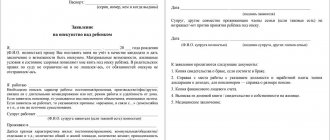The established norms of the current legislation describe in as much detail as possible how registration should be completed in various situations.
Each individual case has its own rules for registration of registration, including both the deadlines and the registration procedure itself.
Dear readers! The article talks about typical ways to resolve legal issues, but each case is individual. If you want to find out how to solve your particular problem , contact a consultant:
+7 (499) 938-81-90 (Moscow)
+7 (812) 467-32-77 (Saint Petersburg)
8 (800) 301-79-36 (Regions)
APPLICATIONS AND CALLS ARE ACCEPTED 24/7 and 7 days a week.
It's fast and FREE !
In this regard, if a guardian is registered at the place of residence of the ward, he should familiarize himself with how this procedure is carried out in 2021.
The principle of registering a guardian at the place of residence of the ward
According to clause 2 of Article 20 of the Civil Code of the Russian Federation, the place of residence of minors under fourteen years of age or citizens under guardianship is recognized as the place of residence of their legal representatives - parents, adoptive parents or guardians.
According to Art. 679 of the Civil Code of the Russian Federation, with the consent of the landlord, tenant and citizens permanently residing with him, other citizens can be moved into residential premises as permanent residents of the tenant. When moving in minor children, such consent is not required. Move-in is permitted subject to compliance with the requirements of the law on the norm of the total area of living space per person, except in the case of the move-in of minor children. According to paragraph 1 of Art.
.
70 of the Housing Code of the Russian Federation, the tenant, with the written consent of his family members, including temporarily absent family members, has the right to move into the residential premises he occupies under a social tenancy agreement his spouse, his children and parents, or with the written consent of his family members , including temporarily absent members of their family, and the lessor - other citizens as members of their family living with him
.
The landlord may prohibit the move-in of citizens as family members living with the tenant if, after their move-in, the total area of the relevant residential premises per family member is less than the accounting norm
.
The consent of the other members of the tenant's family and the consent of the landlord are not required to move in with the parents of their minor children. According to the Decree of the Government of the Russian Federation of July 17, 1995 N 713 “On approval of the rules for registration and deregistration of citizens of the Russian Federation at the place of stay and place of residence within the Russian Federation and the list of officials responsible for registration”, registration at the place of stay for minor citizens under 14 years of age is carried out on the basis of identity documents of their parents (adoptive parents, guardians) or close relatives, as well as the birth certificate of these minors with the issuance of a registration certificate at the place of stay.
According to paragraph .
2 tbsp. 8 Federal Law “On additional guarantees for social support for orphans and children left without parental care” dated December 21, 1996
.
N 159-FZ registration of orphans and children left without parental care is carried out both at the place of residence and at the place of temporary stay
.
In this case, the place of residence of the child includes the place where the living space is assigned to him,
i.e.
permanent housing, and at the place of stay - an institution for orphans and children left without parental care, a hostel, a family of a guardian (trustee), a foster family. In accordance with paragraph 2 of Art. 8 Federal Law N 159-FZ, removal of orphans and children without parental care from registration at the place of residence or place of stay is carried out only with the consent of the guardianship and trusteeship authorities. However, the removal of a citizen from registration at the place of residence is carried out by the registration authority in the event of a change in place of residence on the basis of the citizen’s application for registration at the new place of residence (this procedure is provided for by the Law on the right of citizens to freedom of movement...)
.
For example, the legal representatives of a minor apply to register a child at a new place of residence, and the registration authority removes the child from registration at the minor’s previous place of residence automatically in the interaction system of the relevant registration authorities
.
A similar legal action - applying for registration at a new place of residence can be independently undertaken by a minor aged 14 to 18 years, and it will also be automatically removed from him in the registration system at his previous place of residence.
Conclusion: It is impossible to discharge a child from the apartment, since in addition to the consent of the parents for his discharge, the consent of the guardianship council is also required, for which deregistration will be regarded as a deterioration in living conditions . In addition, a minor cannot be discharged to anywhere.
We found a baby from another region, while we have formalized guardianship and are going to court at the place of residence. We are faced with the problem that we cannot register the child at our place of residence, since he has dashes in the Mother and Father column on his certificate, and therefore it is considered that he does not have Russian citizenship
. It is clear that we will get it through the court, but I would like to register the child for now before receiving a court decision.
Has anyone encountered this? Can you advise how to get out of this situation?
I am a guardian of 2 children with cerebral palsy. They are registered in St. Petersburg, I am in the region
. Can I register where my guardians are registered?
Answer
Yes, this is possible, since in accordance with paragraph 2 of Article 36 of the Civil Code of the Russian Federation, guardians of minor citizens are required to live together with their wards. Separate living is allowed when wards reach sixteen years of age with the permission of the guardianship and trusteeship authority, if this does not negatively affect the education and protection of the rights of wards
.
You must notify the guardianship and trusteeship authorities of your change of residence. In accordance with paragraph 28 of the Decree of the Government of the Russian Federation of July 17, 1995
. N 713 “On approval of the Rules for registration and deregistration of citizens of the Russian Federation at the place of stay and place of residence within the Russian Federation and the list of officials responsible for registration” registration at the place of residence of minor citizens under fourteen years of age is carried out on the basis documents confirming the establishment of guardianship and birth certificates of these minors. After registration, a certificate of registration at the place of residence is issued.
After the appropriate response is received from the authorized employees of the guardianship authority, the guardian will need to submit an appeal to the local municipal authority so that government officials give their permission to register registration on the territory of municipal real estate, and also obtain written consent to carry out this operation from every citizen who is currently registered in the specified housing. After collecting a complete package of all necessary documentation, a corresponding application can be submitted to the passport office in order to register at the place of residence of the child under guardianship.
Does the guardian have the right to register in the apartment?
Therefore, in order to register your wife in this apartment, you need to obtain the consent of the PLO. 2. The place of residence of minors under fourteen years of age or citizens under guardianship is recognized as the place of residence of their legal representatives - parents, adoptive parents or guardians.
Let's start with the fact that by registering in it you want to acquire ownership.
1. You must register as a tenant, or privatize the apartment.
The principle of registering a guardian at the place of residence of the ward
Guardians and trustees are obliged to take care of the maintenance of their wards, to provide them with care and treatment, to protect their rights and interests. Guardians and trustees of minors must take care of their education and upbringing.4. The responsibilities specified in paragraph 3 of this article are not assigned to guardians of adult citizens whose legal capacity has been limited by the court.5
. If the grounds on which a citizen was declared incompetent or partially incompetent due to alcohol or drug abuse have disappeared, the guardian or trustee is obliged to petition the court to recognize the ward as legally competent and to remove guardianship or trusteeship from him.
About rights and responsibilities
Rights:
- Getting help when visiting medical institutions.
- Taking various measures to preserve the property of the ward.
- Protecting the interests of another citizen when contacting authorities.
- Appeal to government agencies so that the ward is assigned various benefits depending on the grounds.
Without permission from the guardianship authorities, transactions with the property of the ward are prohibited. To get a positive decision, you need to prove the feasibility of the transaction itself.
But guardians are also assigned certain responsibilities:
- Manage transfers from the state for the ward. Most situations require the preparation of appropriate reports.
- Fulfillment of obligations that the other party previously had.
- Upholding rights.
- Preservation of property, full protection.
- Control of hygiene and health status.
- Purchasing food, clothing and other essentials.
School performance is monitored separately when it comes to minors.
The principle of registering a guardian at the place of residence of the ward
The established norms of the current legislation describe in as much detail as possible how registration should be completed in various situations.
Dear readers! The article talks about typical ways to resolve legal issues, but each case is individual. If you want to find out how to solve your particular problem , contact a consultant:
+7 (Saint Petersburg)
APPLICATIONS AND CALLS ARE ACCEPTED 24/7 and 7 days a week.
It's fast and FREE !
In this regard, if a guardian is registered at the place of residence of the ward, he should familiarize himself with how this procedure is carried out in 2021.
Necessary by law
In accordance with the standards specified in Law No. 159-FZ, issued on December 21, 1996, children in their care must be registered in residential premises that are not their main place of residence, if this housing is occupied by the guardian’s family or foster family.
This procedure is carried out on the basis of documents that confirm the fact that guardianship has been established by the specified person. In other words, a ward child must be registered at the residence address of his guardian until he reaches the age of majority.
Even the registration of a ward of a minor child does not require the need to obtain any consent from the owner of the provided property or any other persons having ownership rights to this housing.
What is guardianship and who is a guardian?
The civil legislation of the Russian Federation allows two schemes for guardianship:
- Full custody.
- Patronage.
The first case assumes complete control on the part of the guardian.
In this case, in the interests of the incapacitated person, the following actions are performed:
- Control over money.
- Organization of everyday life.
- Quality of life control.
If we are talking about patronage or partial guardianship, assistance is provided in the area that is of greatest interest. Usually this concerns registration, transfer of any documents, interaction with regulatory authorities, and so on.
Registration procedure
In accordance with the rules established by current legislation, a guardian can register in the apartment that is currently occupied by the child under his care. Moreover, before submitting the corresponding application for registration to the passport office, it is best for the guardian to study as carefully as possible the conditions stipulated in the drawn up guardianship agreement, and in particular, read the clause establishing the rules and conditions under which the residence and use of the specified real estate.
The application must clearly indicate the reasons on which the person wants to obtain registration at the residence address of the person under guardianship, and in addition, the same document must contain a request for permission to obtain registration in municipal real estate occupied by the person under guardianship .
After the appropriate response is received from the authorized employees of the guardianship authority, the guardian will need to submit an appeal to the local municipal authority so that government officials give their permission to register registration on the territory of municipal real estate, and also obtain written consent to carry out this operation from every citizen who is currently registered in the specified housing.
After collecting a complete package of all necessary documentation, a corresponding application can be submitted to the passport office in order to register at the place of residence of the child under guardianship.
Among other things, the guardian should not forget that the guardianship authorities monitor quite closely the extent to which the rights of the child under guardianship are respected, and therefore, if any violations are discovered, an unscrupulous citizen can simply be removed from their duties, which leads to accordingly, to subsequent deregistration.
The guardian occupied the ward's apartment. is this legal?
- Can a guardian receive a pension for the last time after the death of the ward? December 22, 2014, 16:59, question No. 663903 1 answer
- If after demolition they give a one-room apartment instead of a two-room one, is this legal? 08 April 2021, 18:43, question No. 1213409 4 answers
- Hello. the wife left, taking the documents for the apartment. Is this legal on her part? Can she apply for alimony without a divorce? How will the apartment be divided if the share is 1/2, but three people are registered? 02 March 2013, 11:53, question No. 49942 3 answers
- I receive receipts for a dead person, the former owner of the apartment, is this legal? December 10, 2021, 20:15, question No. 1469513 2 answers
- My ex-wife filed for alimony from the moment she kicked me out of the apartment in May.
Temporary and permanent registration of a guardian at the place of residence of the ward
Before a child reaches the age of majority, his guardian may be granted registration at his place of residence. It is worth noting the fact that in this case a simplified procedure for terminating registration is provided, which, first of all, meets the interests of the foster parents. It is worth noting that permanent registration for guardians is not currently provided.
The key problem with registration of permanent registration at the place of residence is that, in accordance with paragraph 31 of the Rules for registration of registration or deregistration established by Government Decree No. 713, a person can be deregistered only if he is recognized as missing, changes his place of residence, is declared dead, or independently evicts from his occupied housing.
Thus, automatic removal from the permanent registration of a guardian after the child reaches the age of majority is not provided, and therefore he can live at the specified address for an unlimited amount of time.
Property relations between the guardian (trustee) and the ward
That is, it is assumed that the child knows that the guardians are not his natural parents. And there is criminal liability for disclosing the secret of adoption. When adopted, the child must be fully integrated into the new family. Court costs will be collected from the defendant in your favor (including state fees and costs for lawyer’s services - Articles 98, 100 of the Code of Civil Procedure of the Russian Federation). I recommend seeking professional legal assistance to competently draft a statement of claim and a package of documents necessary for the court, and, if necessary, to support a civil case in court.
A month ago I called them again and asked if there would be a positive decision if I rented a house and brought them a lease agreement. The Guardian Lady said that before there would have been no problems, but she had just come from court, where the judge was “indignant that the Guardianship gave permission on the basis of a lease agreement to a couple who are permanently registered in different cities of the country and have a lease agreement in Moscow.”
It also does not give you the right to register. Rave! The guardian has only the right to manage the affairs of his ward! but has no rights to housing! But he can sell the apartment with the consent of the administration! only the right to residence If the apartment is in social security. hiring, then yes.
FAQ
| What is adoption? | Today, this form of raising orphans is the most optimal, since in the process of adopting a child, exactly the same legal relations arise between him and the guardian that are formed after the birth of the child between him and the parents. Adoption is carried out after the relevant application is submitted to the court by the interested parties. |
| How to become a guardian? | Guardianship or guardianship is established over those children who are left without parents for the purpose of their upbringing, maintenance and education. In this case, the guardians are persons appointed by the leadership of the local government, and the duties will be performed absolutely free of charge. Any legal relationship between guardians and children ceases completely after the ward reaches the age of majority. |
| How is a foster family formed? | The formation of a foster family is carried out on the basis of an agreement on the transfer of a child for upbringing to a specific family. This agreement is concluded between adoptive parents and guardianship authorities. |
We will tell you further where to get a registration certificate in Form 8.
You can find a form for a certificate of registration in this article.
- Due to frequent changes in legislation, information sometimes becomes outdated faster than we can update it on the website.
- All cases are very individual and depend on many factors. Basic information does not guarantee a solution to your specific problems.
That's why FREE expert consultants work for you around the clock!
- via the form (below), or via online chat
- Call the hotline:
- Moscow and the Region
- St. Petersburg and region
- Regions
APPLICATIONS AND CALLS ARE ACCEPTED 24/7 and 7 days a week.
Is it possible to register a child alone in an apartment, without parents or guardians?
Entering into inheritance after the death of relatives: who has the right, what documents are needed and how is registration done?
Everything related to child custody is the area of family law. If there is “not enough” legislation in family law, it is established that it is necessary to use terms and norms from civil law.
The listed documents must be provided in originals and copies. To register in a municipal apartment, everyone who is registered in the apartment must be present in person. When someone cannot be present in person, it is necessary to provide notarized consent or provide a power of attorney.
Permission for registration from the owner of municipal housing is written in free form with a passport service employee. It must reflect information about the person registering and the address of the municipal apartment. After 3 working days, the registration authorities issue a passport with a registration stamp.
Registration is free, there is no state fee.
The only expense that can be incurred is the filling out of documents by housing office employees; they must notify you of this in advance. Everyone registered in municipal housing must fulfill their responsibilities: pay utility bills, carry out major repairs. If the owner fails to fulfill his obligations, he may refuse to allow residents to stay.
A child is registered in municipal housing without the consent of other residents. When parents have different registration addresses, then a certificate should be taken from the place of registration of the second one stating that the child is not registered there. You also need the consent of the other parent to complete the registration.
When registering a child in a municipal apartment, housing department authorities are provided with:
- statement;
- child's birth document;
- parents' passports;
- Marriage certificate;
- certificates of registration of parents.
The principle of registering a guardian at the place of residence of the ward
According to clause 2 of Article 20 of the Civil Code of the Russian Federation, the place of residence of minors under fourteen years of age or citizens under guardianship is recognized as the place of residence of their legal representatives - parents, adoptive parents or guardians.
According to Art. 679 of the Civil Code of the Russian Federation, with the consent of the landlord, tenant and citizens permanently residing with him, other citizens can be moved into residential premises as permanent residents of the tenant. When moving in minor children, such consent is not required. Move-in is permitted subject to compliance with the requirements of the law on the norm of the total area of living space per person, except in the case of the move-in of minor children. According to paragraph 1 of Art.
.
70 of the Housing Code of the Russian Federation, the tenant, with the written consent of his family members, including temporarily absent family members, has the right to move into the residential premises he occupies under a social tenancy agreement his spouse, his children and parents, or with the written consent of his family members , including temporarily absent members of their family, and the lessor - other citizens as members of their family living with him
.
The landlord may prohibit the move-in of citizens as family members living with the tenant if, after their move-in, the total area of the relevant residential premises per family member is less than the accounting norm
.
The consent of the other members of the tenant's family and the consent of the landlord are not required to move in with the parents of their minor children. According to the Decree of the Government of the Russian Federation of July 17, 1995 N 713 “On approval of the rules for registration and deregistration of citizens of the Russian Federation at the place of stay and place of residence within the Russian Federation and the list of officials responsible for registration”, registration at the place of stay for minor citizens under 14 years of age is carried out on the basis of identity documents of their parents (adoptive parents, guardians) or close relatives, as well as the birth certificate of these minors with the issuance of a registration certificate at the place of stay.
According to paragraph .
2 tbsp. 8 Federal Law “On additional guarantees for social support for orphans and children left without parental care” dated December 21, 1996
.
N 159-FZ registration of orphans and children left without parental care is carried out both at the place of residence and at the place of temporary stay
.
In this case, the place of residence of the child includes the place where the living space is assigned to him,
i.e.
permanent housing, and at the place of stay - an institution for orphans and children left without parental care, a hostel, a family of a guardian (trustee), a foster family. In accordance with paragraph 2 of Art. 8 Federal Law N 159-FZ, removal of orphans and children without parental care from registration at the place of residence or place of stay is carried out only with the consent of the guardianship and trusteeship authorities. However, the removal of a citizen from registration at the place of residence is carried out by the registration authority in the event of a change in place of residence on the basis of the citizen’s application for registration at the new place of residence (this procedure is provided for by the Law on the right of citizens to freedom of movement...)
.
For example, the legal representatives of a minor apply to register a child at a new place of residence, and the registration authority removes the child from registration at the minor’s previous place of residence automatically in the interaction system of the relevant registration authorities
.
A similar legal action - applying for registration at a new place of residence can be independently undertaken by a minor aged 14 to 18 years, and it will also be automatically removed from him in the registration system at his previous place of residence.
Conclusion: It is impossible to discharge a child from the apartment, since in addition to the consent of the parents for his discharge, the consent of the guardianship council is also required, for which deregistration will be regarded as a deterioration in living conditions . In addition, a minor cannot be discharged to anywhere.
What property is a ward entitled to own?
As stated above, we are talking about children under 14 years of age.
Until the specified age, they did not even reach limited legal capacity. Accordingly, such a child can act as a subject of law only with significant restrictions. At the same time, the law establishes the right of children to own property.
And this has nothing to do with their age. For example, a child may receive real estate by inheritance or as a result of a gift transaction. However, he may not reach the age of 14.
But this circumstance in no way excludes his right to own this or that thing or property. Therefore, those under guardianship retain all their property.
Assets that children may own include:
- real estate . This is the most common type of ward asset. Apartments or part of a house can be acquired as a result of inheritance or otherwise. In any case, the child remains the owner of the property;
- bank deposits . Often parents open a deposit for their child. Funds are gradually accumulating there. Therefore, only the child will be able to manage these funds after reaching full legal capacity at 18 years of age;
- any other movable property . These could be cars, inherited jewelry, equipment, and so on.
The ward has no right to use his property. That is, he can use things, but he does not have the full range of rights of the owner.
For example, the ward does not have the opportunity to sell the specified property, mortgage it, exchange it or donate it. It belongs to him, but he has no right to alienate it.
The principle of registering a guardian at the place of residence of the ward
Guardians and trustees are obliged to take care of the maintenance of their wards, to provide them with care and treatment, to protect their rights and interests. Guardians and trustees of minors must take care of their education and upbringing.4. The responsibilities specified in paragraph 3 of this article are not assigned to guardians of adult citizens whose legal capacity has been limited by the court.5
. If the grounds on which a citizen was declared incompetent or partially incompetent due to alcohol or drug abuse have disappeared, the guardian or trustee is obliged to petition the court to recognize the ward as legally competent and to remove guardianship or trusteeship from him.
Design: main features
Filing a petition with the district court is the first step in any guardianship procedure. This right is granted only to persons of a certain circle:
- Doctors at a psychiatric clinic.
- Representatives of guardianship authorities.
- Siblings.
- Fathers and mothers.
- Adult children.
- Wives and husbands, other persons living together or separately.
Citizens are deprived of the right to file a claim against themselves. The judge makes a decision only after considering the arguments of both sides. The guardianship authorities receive verdicts in such cases at least three days later. The search for a guardian must be completed within the next three months. If the guardianship authorities fail to cope with this task, they will take on the corresponding functions themselves.
Another citizen who intends to take on the role of a guardian cannot do without drawing up an application to the relevant authorities. You will need to collect a number of certificates to prove your good health and stable financial situation. Other personal information is important, including the absence of a criminal record.
Typically, one package of documents is reviewed within about a week.
After this, a separate examination is organized in relation to living conditions. If there are no particular complaints, a verdict is passed on the appointment of a guardian.
How to register a guardian in a municipal apartment
In addition, the court found that the previously indicated housing, where the plaintiff asks to register, was the subject of repeated consideration by the courts. The court believes that the plaintiff has no grounds to satisfy her claim to compel the defendant to register her in the specified residential area, her demands are unfounded
.
Based on the above and guided by Articles 194-198 of the Code of Civil Procedure of the Russian Federation, the court DECISIONED: Vera Grigorievna Marycheva’s claim against the Administration of the Pokhvistnevo Urban District of the Samara Region for compulsion to give permission for registration at the place of residence of the ward is denied. The decision can be appealed to the Samara Regional Court through the Pokhvistnevsky District Court within 10 days
. Judge O.A.
What documents are needed to resolve the issue?
Thanks to the available papers, it is easier to evaluate candidates and see what their negative and positive sides are. The standard list of documents looks like this:
- Help in form 2NDFL.
- A document to prove that there is no criminal record.
- The result of the examination of the candidate’s living space.
- Pension certificate, if available.
- Certificate from a psychiatrist, narcologist.
- Consent of relatives with the representation of guardianship rights.
- Certificate of completion of relevant courses.
- A verdict declaring a person incompetent.
- A document confirming that you have your own living space.
- Employment history.
- The applicant's civil certificate.
- Autobiography, handwritten.
- Medical research results.
- Income certificate.
We must remember that some certificates have a limited validity period. This is especially true for medical reports and information regarding total earnings. Obtaining detailed information is simplified when communicating in legal forums and with representatives of guardianship authorities.








